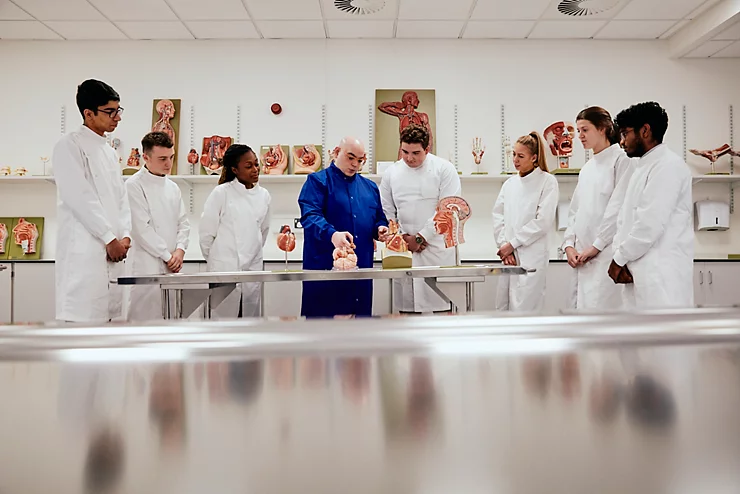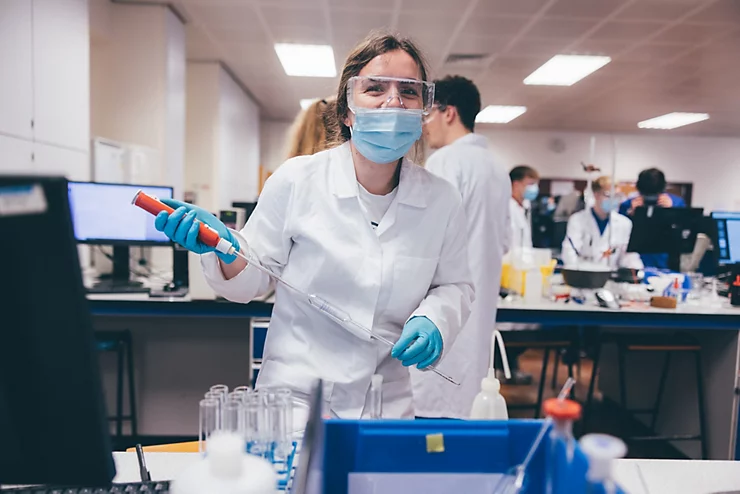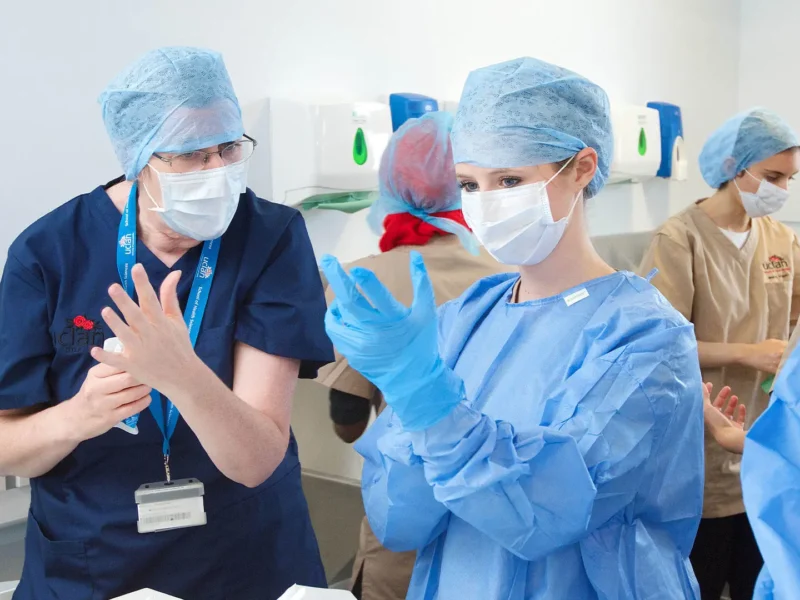Medical schools in the UK have varying entry requirements, but some offer more leniency than others. For standard entry medicine, common requirements include achieving 37 points in the International Baccalaureate, with chemistry and another science subject.
Alternatively, students may need AAA grades in A-levels, including chemistry and other sciences like maths, physics, biology, or psychology.
Additionally, a minimum overall score of 7.5 in IELTS, with no component lower than 7.0, may be required. It’s important to note that these are general guidelines, and individual schools may have specific criteria. Always check with the specific medical schools you’re interested in for precise details.
What Are the Lowest Entry Requirements for Medicine in the UK?

Let’s explore what you need to study medicine in the UK, including grades and other stuff.
Academic Requirements
GCSEs: Most UK medical schools require a minimum of Grade 6 (or B) in GCSE English Language, GCSE Mathematics, and at least one science subject (usually Biology, Chemistry, or Physics).
A-levels: The typical A-level grades required for Medicine are AAA, although there are exceptions. For example, Oxford typically requires A*AA, and some universities may accept AAB.
International Baccalaureate (IB): A score of 37 points, including Chemistry and another science subject.
Equivalent Qualifications
Medical schools also consider equivalent qualifications. For example, some universities accept the Scottish Highers or Advanced Highers as an alternative to A-levels.
Non-Academic Requirements
Gaining experience or volunteering in healthcare is important for those who want to become doctors. You can learn a lot by working with the NHS, where you can do different jobs like helping patients or doing office work.
Volunteering with Healthwatch or local NHS Trusts is also helpful. If you’re between 14 and 18 years old, you can join St John Ambulance Cadets to learn first aid and work in NHS hospitals.
You can also help other charities that work with the NHS. In your personal statement when applying for medical school, talk about why you want to be a doctor, your experiences, and what makes you a good fit. Get ready for interviews and tests like MMIs, UKCAT, or BMAT.
UCAT and BMAT
Some medical schools accept either the UCAT or the BMAT. The key difference lies in when you sit these exams: the UCAT is taken before your UCAS application, while the BMAT is taken afterward.
Additionally, while the UCAT score itself is important, some medical schools consider the Situational Judgement component, while others do not.
For applicants scoring Band 1 in the Situational Judgement assessment, it’s crucial to research how medical schools weigh this component, as it could significantly enhance your application.
Certain universities, such as Edinburgh, Hull-York, King’s, Lincoln, and Nottingham, award points for a high SJT band score.
On the other hand, scoring Band 4 may lead to automatic rejection from universities like Anglia Ruskin, Edinburgh, Keele, Leicester, Lincoln, Liverpool, Newcastle, Nottingham, and Manchester.
However, it’s advisable to verify entry requirements yearly, as they may slightly differ. Most medical schools employ the UCAT, with a few opting for the BMAT.
Schools may also use varying cutoffs for the UCAT, so it’s essential to check each school’s admissions website for the specific cutoff for the year you’re applying.
Keele University and Plymouth University typically have lower cutoffs, with a score around 610 considered acceptable for the UCAT. For the BMAT, a score of 6.0-7.0 is deemed good, while the average is 5.0.
Are there medical schools with easier entry requirements?

While getting into medical schools in the UK is competitive, some institutions have more lenient entry requirements.
Remember that while these schools may be considered “easier” to get into, securing a spot’s still a significant achievement. Here are a few medical schools known for their relatively accessible admission process
Queen’s University Belfast School of Medicine
The acceptance rate for studying medicine in the UK is around 14.9%. To meet the standard offer, applicants typically need to achieve AAA grades, with at least two science subjects, including Chemistry or Biology.
University of Manchester Medical School
The largest medical school in the UK has a variable acceptance rate, but it tends to be relatively favorable. To meet the standard offer for admission, applicants usually need to achieve AAA grades, including two science subjects such as Chemistry or Biology.
University of Leeds School of Medicine
This school has top accreditation from AACSB, AMBA, and EQUIS. It’s not too hard to get in, and to get accepted, you usually need AAA grades, with two of them being in science subjects like Chemistry or Biology.
University of Liverpool School of Medicine
Affiliated with the University of Liverpool, this institution is known for its accessible acceptance rate. For admission, they typically require AAA grades, including two science subjects like Chemistry or Biology.
FAQ
How can I increase my chances of getting into medical school UK?
To enhance your chances of admission to medical school in the UK, focus on excelling in sciences at GCSE and A-level, engage in relevant extracurricular activities, gain pertinent work experience, score well in UCAT or BMAT exams, write a compelling personal statement, and prepare thoroughly for medical school interviews.
What is the fastest way to become a doctor in the UK?
The quickest route to becoming a doctor in the UK is to pursue a standard entry medicine program, typically lasting 5-6 years, or graduate entry medicine, which takes 4-5 years. After graduation, you’ll undergo foundation training, followed by further specialization, which can range from 3+ years for GP to 5-8 years for other specialties.
Which UK medical schools accept the most international students?
Several UK medical schools, including University College London (UCL), University of Manchester, University of Edinburgh, and University of Glasgow, accept international students. Additionally, many other medical schools in the UK welcome students from around the world.
What is the maximum age to study medicine in the UK?
There is no official maximum age limit for studying medicine in the UK. Medical schools accept students of various ages, including those in their 30s, 40s, and even 50s. However, it’s essential to consider factors like cost, training time, and the demanding nature of the profession before pursuing a medical career later in life.
Can I study medicine in UK after 12th?
Yes, you can study medicine in the UK after completing your 12th grade. Requirements typically include IELTS or TOEFL scores, language proficiency, and relevant qualifications. Studying medicine after 12th offers exposure, recognition, and diverse career options, but it’s important to meet the specific entry requirements of each medical school.
What is the best age to start studying medicine?
There is no specific ideal age to start studying medicine. What matters most is your passion for medicine rather than your age. Studying abroad offers benefits such as exposure to diverse healthcare systems, international recognition, and a wide range of career opportunities.
Final thoughts
When applying to study medicine in the UK, the requirements can differ between universities, but there are some key things to keep in mind. It’s important to do well in subjects like Biology and Chemistry, get relevant work experience, and write a strong personal statement. Also, learn about the application process for each school and what they’re looking for to improve your chances of getting in.



